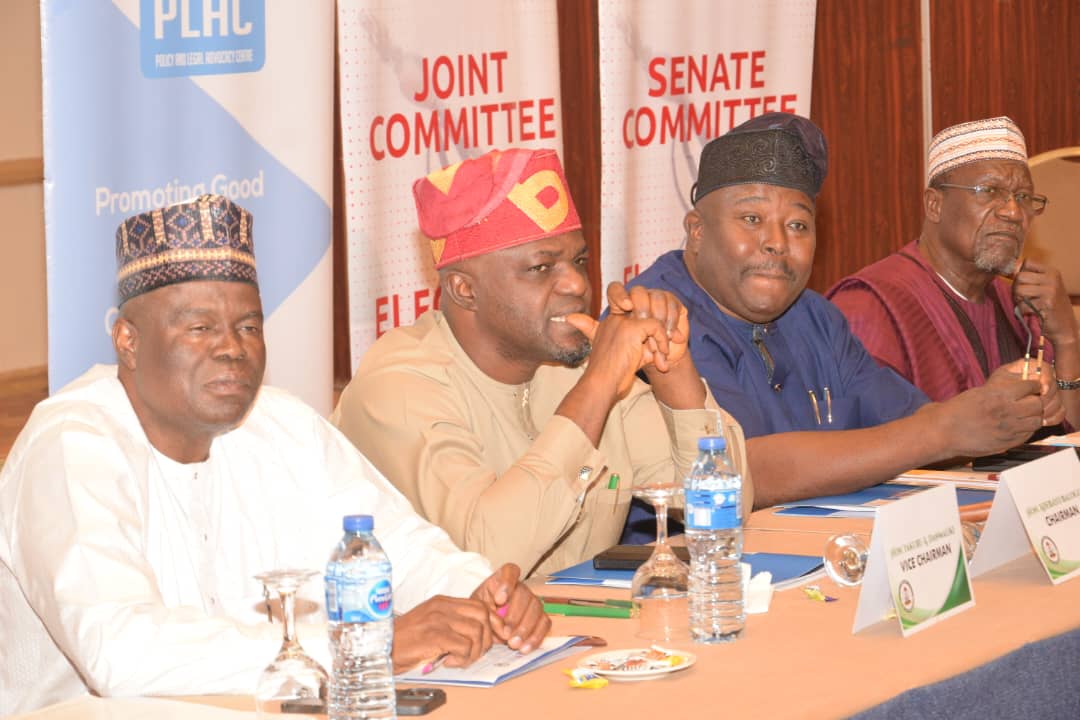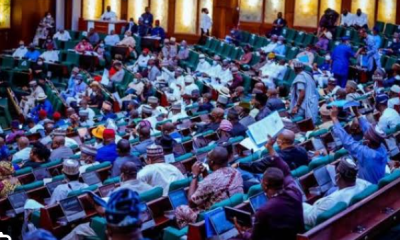News
INEC Call For Stricter Laws to Curb Vote-Buying at Polling Units

The Independent National Electoral Commission (INEC) has urged the National Assembly to pass tougher laws restricting the possession of large sums of money within polling areas to combat vote-buying and other electoral offences.
The Director of Litigation and Prosecution INEC, Tanimu Muhammed (SAN), raised concerns over vote-buying, describing it as a serious threat to Nigeria’s democracy, at a consultative meeting with security agencies and the technical committee on electoral law reforms on Friday in Abuja.
The meeting was organised by the Joint Senate and House of Representatives Committees on Electoral Matters, in partnership with the Policy and Legal Advocacy Centre (PLAC) and supported by the UK Foreign, Commonwealth, and Development Office (FCDO), and had key stakeholders in attendance to discuss electoral security and legal reforms.
Muhammed stated that politicians often claim they carry large sums on election day for party agent payments and logistics. However, he warned that unrestricted cash flow at polling units has encouraged vote-buying and undermined electoral integrity.
To tackle this issue, Muhammed proposed a legal limit of ₦50,000 for individuals within polling areas on election day.
The commission therefore called on lawmakers to focus on amending laws to eliminate loopholes frequently exploited by politicians.
INEC officials also renewed their call for the creation of an Electoral Offences Commission, stressing that the commission currently lacks the capacity to prosecute electoral offenders effectively.
News
Our members defecting to APC have ‘sins’ and are soliciting for forgiveness – Senator Abba Moro

Senate Minority Leader, Abba Moro, has said that soon people would understand the reason for mass defections from other political parties to the ruling All Progressives Congress (APC).
Recall there has been a gale of defections from the Peoples Democratic Party (PDP) to the APC.
Former presidential running mate of the PDP, Ifeanyi Okowa, Delta State Governor, Sheriff Oborevwori, and all PDP members in the House of Representatives from Delta State, defected to the APC.
Similarly, three PDP senators from Kebbi State defected to the APC.
In an interview with AIT’s ‘Focus Nigeria’, Moro said those party members who defected to the APC have sinned and are looking for forgiveness.
He said, “When history unfolds, we are going to have the privilege of knowing the main reasons why people are moving from PDP to the ruling party.
“It has always been the practice though, people don’t want to stay outside the corridors of power and so they quickly begin to realize that in the opposition, they won’t be getting as much as they want to get.
“Some of them who have been helmsmen at their various levels in the states, LGs, and Senate certainly have more reasons than Mets the eyes to moving to the ruling party.
“Don’t forget that a chieftain of the APC at one point said, if you move from your party to the APC, your sins are forgiven – so given the antecedents of some of the characters that are moving now – you can only conclude that they are only attesting to this assertion.
“They have sins and are looking for forgiveness, politically, these displaced persons may be going to the ruling party to ask for forgiveness, but is it in the interest of this country? Is it in the interest of democracy? Is it in the interest of the political development of this country that people continue to move from one political platform to the other?
“Where have principles taken flight to? Where has value taken flight to? You were elected on the platform of a political party and as the Supreme Court ruled, its political parties that people vote for, then you suddenly decide that you want to move to another political party which is predicated on the nebulous excuse that you are doing that in the interest of your constituency.”
News
INSECURITY! Ten killed in Plateau over attack linked to cattle rustling, farm destruction

No fewer than 10 people have been killed and several cows rustled in renewed violence in Riyom Local Government Area of Plateau State.
The recent escalation of violence in Riyom stems from farm destruction, cattle rustling, and attacks on livestock carried out by individuals from both Fulani and Berom communities.
According to a statement from Operation Safe Haven, the recent insecurity in the council area began on Monday, May 12, 2025, when suspected youths slaughtered and rustled cattle that had encroached on their farms in Dayan village, Riyom Local Government Area.
In retaliation, suspected Fulani herders attacked Danchindo village on the evening of May 13, killing four people before fleeing ahead of security operatives’ arrival.
On May 14, 26 cows were killed and several others injured in the Darwat community, allegedly in reprisal for the earlier killings of locals. Later that day, suspected Fulani militias retaliated by attacking an isolated settlement near the Wereng Kam community, killing six locals.
Upon receiving reports of rising tensions in Riyom, officers of the Joint Security Task Force engaged community representatives to broker peace and warned against actions that could further destabilise the fragile situation.
In response to allegations of cattle rustling and slaughtering, one suspect has been arrested and is currently under investigation, while 130 cows have been recovered and returned to their owners.
The statement added that the troops’ swift response prevented the assailants from completely burning down Wereng village. A mop-up operation was launched to neutralise fleeing militants, as troops continue to maintain a strong presence to restore order.
Major General Folusho Oyinlola, commander of Operation Safe Haven and General Officer Commanding 3 Division, visited the area and met with stakeholders and community leaders. Normalcy has returned, supported by the presence of security operatives working to maintain law and order.
This Riyom incident is coming four days after five traders who are residents of Dogon Ruwa community in Bashar district of Wase Local Government Area of Plateau State were abducted during a bandits’ attack on a market in the area.
The incident occurred on Monday morning, the market day, with an influx of traders and buyers from neighbouring communities conducting business activities.
According to residents who escaped the onslaught, the invaders came in large numbers on motorcycles at the peak of business transactions.
They shot sporadically as traders and residents scampered to safety, forcing people to flee the market and their homes.
In the past few months, hundreds of people have been killed and many more displaced after gunmen attacked several communities in the North-Central state.
In the wake of the renewed attacks, Governor Caleb Muftwang labelled them genocidal and an attempt at land grabbing.
News
Senate mulls terrorism charges for oil theft offenders

The Senate, yesterday, issued a stern warning that perpetrators of oil theft in the Niger Delta region may soon face terrorism charges and other stiffer penalties.
Senate President, Godswill Akpabio, disclosed this while declaring open a two-day public hearing on the “Incessant and nefarious acts of crude oil thefts in the Niger Delta and the actors held.”
The hearing organised by the Senate Ad-hoc Committee on Incessant Crude Oil Theft chaired by Ned Nwoko is aimed at addressing the persistent theft of crude oil in the Niger Delta and produce actionable solutions to the problem.
Akpabio, who was represented by his deputy, Barau Jibrin, said the 10th National Assembly would not stand idly by as the country loses billions of dollars annually to what he described as “brazen economic sabotage.”
He disclosed that the National Assembly was considering a range of strong legislative responses, including categorising major acts of oil theft as terrorism, mandatory digital metering for all oil production and exports, real-time monitoring, improved transparency in crude lifting and revenue reporting, as well as enhanced coordination among military, law enforcement, and anti-corruption agencies.
“Crude oil theft is not a victimless crime. It is directly responsible for economic instability, a weakened naira, underfunded critical sectors, and widespread poverty in oil-producing communities. It also finances illegal arms, fuels violence, and strengthens criminal networks.”
Akpabio lamented that despite past efforts, crude oil theft continues unabated due to systemic failures and gaps in enforcement and oversight. Recent reports estimate that Nigeria loses between 150,000 and 400,000 barrels of crude oil daily, costing the country billions in lost revenue.
“This public hearing must address critical questions: Who are the perpetrators? Are they militants, corrupt officials, international collaborators—or all three? Why have current security measures failed? And how are stolen shipments leaving the country undetected?” he asked.
The Senate President called on all stakeholders including regulatory agencies, oil companies, security forces and host communities, to work collaboratively to stop the looting of the country’s most valuable resource. He emphasised that oil companies must invest in surveillance technology and secure infrastructure, while host communities should act as first-line defenders rather than victims or accomplices.
“To the criminals stealing our crude oil, your time is up. To the agencies tasked with protecting our resources, the nation is watching. And to this Ad-hoc Committee, the Senate expects a robust, no-holds-barred report that will guide firm legislative and executive action.”
Akpabio commended Nwoko, who chairs the Committee convening the hearing and stressed that the recommendations must lead to actionable, measurable and time-bound solutions.”
“The survival of Nigeria’s economy depends on how we respond to this crisis,” he concluded.
Meanwhile, ahead of its planned two-day national security summit, the Senate, yesterday, set up a 20-member committee to organise the event.
The Senate President, Akpabio, who announced the committee’s formation during plenary, said it would be chaired by the Senate Leader, Opeyemi Bamidele, with Yahaya Abdullahi serving as the vice chairman.
Other members are Ireti Kingibe (FCT), Adebule Idiat (Lagos), Barinada Mpigi (Rivers), Babangida Hussaini (Jigawa), Jimoh Ibrahim (Ondo), Osita Ngwu (Enugu), Tahir Monguno (Borno), Titus Zam (Benue), Ahmed Lawan (Yobe), Abdulaziz Yar’Adua (Katsina), Gbenga Daniel (Ogun), Austin Akobundu (Abia), Shehu Buba (Bauchi), Ahmed Madori (Jigawa), Emmanuel Udende (Benue), Adams Oshiomhole (Edo), Shuaib Salisu (Ogun), Isah Jibrin (Kogi) and the Clerk of the Senate, Andrew Nwoba.
The committee is tasked with developing the summit’s framework, including setting the agenda, identifying core issues for discussion, and recommending actionable strategies to improve national security. Akpabio directed the committee to submit its report within two weeks.
The decision to convene the summit followed a resolution passed on May 6 after a motion sponsored by Jimoh Ibrahim to address escalating security challenges in the country was adopted. It is expected to address pressing issues such as terrorism, insurgency, and the alarming trend of leaking military intelligence to militant groups, an issue widely seen as compromising ongoing security operations.
This is not the first time the National Assembly would attempt to address security concerns through a summit. In May 2021, the ninth Assembly, under the then Senate President, Ahmad Lawan and House Speaker, Femi Gbajabiamila, organised a similar summit. Despite contributions from security experts, civil societies, and government agencies, insecurity has continued to plague the country.
-

 News22 hours ago
News22 hours agoAlleged cyber bullying: IGP re-arraigns VDM
-

 News24 hours ago
News24 hours agoBREAKING: PDP, NNPP Rep members abandon parties, lace boots with APC
-

 News21 hours ago
News21 hours agoBill To Make Voting Compulsory For Nigerians Passes Second Reading
-

 News3 hours ago
News3 hours agoINSECURITY! Ten killed in Plateau over attack linked to cattle rustling, farm destruction
-

 Health11 hours ago
Health11 hours agoLassa fever claims 138 lives in 2025, cases spread to 18 states – NCDC
-

 News24 hours ago
News24 hours agoLASG moves to introduce monthly rent payment system to ease burden on tenants
-

 Economy6 hours ago
Economy6 hours agoSEE Current Black Market Dollar (USD) To Naira (NGN) Exchange Rate
-

 News11 hours ago
News11 hours agoNkechi Blessing Confirms Break Up With Lover
















